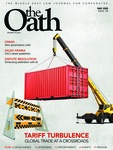Resolving jurisdictional disputes

Hessam Kalantar of KBLG shares insights on the Emirate of Dubai’s decision to adopt a legislative solution to manage conflicts of jurisdiction between the Dubai Courts and DIFC Courts.
On April 3 of this year, the Ruler of Dubai issued a decree authorising the creation of a new judicial body whose sole purpose is to resolve jurisdictional disputes between the parallel court systems in the Emirate of Dubai.[1] These parallel judicial systems are the Dubai Courts on the one hand, and the courts of the DIFC on the other (with the latter being a semi-autonomous “financial free zone” having its own courts and statutes derived from, or influenced by, English common law).
Decree No. 29 of 2024 is a legislative solution to a problem which arose out of the presence of parallel judicial authorities in the Emirate of Dubai. Certain cases like Ledger v Leeor (2022)[2] presented the question of which judicial body in the Emirate may properly exercise jurisdiction when it was unclear which of DIFC Courts or Dubai Courts the parties had selected. Because financial free zones like the DIFC were in part created to provide litigants with familiar and predictable regulatory frameworks to efficiently resolve disputes, forcing parties into procedural labyrinths relating to jurisdictional questions risks undermining key benefits of financial free zones like DIFC.
We provide here a summary of the jurisdictional dispute in Ledger to illustrate in more detail the problem Decree No. 29 of 2024 was intended to address. We then discuss an alternative to the legislative solution the Emirate of Dubai ultimately chose–an approach represented by a recent decision of the Supreme Court of the United Kingdom in UniCredit v. RusChemAlliance.
Ledger v Leeor illustrates procedural obscurities in jurisdictional disputes between the Dubai Courts and DIFC Courts.
The parties in Ledger entered into a contract for the construction of a residential building in Dubai which contained a provision requiring the parties to resolve all disputes by binding arbitration seated in Dubai. Given the existence of parallel judicial systems in the Emirate of Dubai following the Emirate’s establishment of the DIFC, the issue in Ledger arose from ambiguity about whether the term “Dubai” (the location specified as the seat of arbitration in the agreement) was a reference to the Emirate of Dubai generally or to DIFC specifically.
One of the parties, in violation of the contract’s arbitration agreement, sued the other in the Dubai Courts. In response, the defendant requested that the DIFC Court of First Instance (CFI) issue an anti-suit injunction to require arbitration. The DIFC Courts declined to enforce the arbitration agreement and deferred to parallel proceedings ongoing in the Dubai Courts. The DIFC Court of Appeal thus missed the opportunity to set clear precedent upholding arbitration agreements by issuing an anti-suit injunction despite the ambiguity concerning the seat.
Decision of the DIFC Court of First Instance
In Ledger, the claimant argued before the CFI that the language in the arbitration agreement referring to “Dubai” was a reference to venue rather than the seat of arbitration. Because “venue” in this context refers to the entire Emirate of Dubai, the arbitration agreement was silent only about the seat of arbitration. And if there was no agreement on the seat of arbitration, Article 4(b) of the DIAC Statute would operate to select DIFC as the seat. Under the claimant’s line of reasoning, the CFI should have issued the requested anti-suit injunction to halt the ongoing proceedings in Dubai Courts, effectively enforcing the parties’ agreement to arbitrate all disputes arising out of their development contract.
Yet the CFI dismissed the claimant’s application for an anti-suit injunction for four reasons. First, the Court could not find “to a high degree of probability” that the arbitration agreement referred to “venue” rather than “seat” of arbitration. Second, it could not identify other reasons to justify exercising discretion to grant the requested anti-suit injunction. Third, it emphasised the value it places on comity with the Dubai Courts, where parallel proceedings were ongoing concerning the jurisdiction issue. Finally, the Court did not observe any “links in relation to applicable law or subject matter” with DIFC.
Decision of the DIFC Court of Appeal
On appeal, the appellant argued that DIFC Courts had jurisdiction to grant the anti-suit injunction because the dispute presents an “exceptional case”, as that concept was used in Brookfield Multiplex to overcome deference, under the principle of comity, to the Dubai Courts. The Court in Brookfield Multiplex determined that, mindful of the “appropriate respect. . . the Courts of the two different systems in the Emirate of Dubai must have for each other”, the DIFC Courts can grant anti-suit injunctions in exceptional and unusual cases.[3] The appellant argued that Ledger presents such an example because the Dubai Court’s refusal to issue an anti-suit injunction in its ongoing proceeding violates the UAE’s obligations under both the New York Convention and the UAE’s Arbitration Law No. 6 of 2018.
The DIFC Court of Appeal dismissed the appeal for three reasons. First, like the CFI, it emphasised the importance of comity between the two parallel court systems within the Emirate of Dubai, implying that the DIFC Court of Appeal did not consider the ongoing litigation in the Dubai Courts to present an “exceptional case” requiring intervention under Brookfield Multiplex. Second, the DIFC Court of Appeal focused on the appeal’s posture as an ex parte request for an injunction, saying it would not “substitute its own provisional views of the law and the facts [for] those of the Primary Judge.” And third, the Court decided that an injunction could not be justified on an ex parte basis because the dispute lacked a sense of urgency (as the Court said, this is “not a case involving dissipation of assets or destruction of evidence”).
The UK Supreme Court’s recent decision in UniCredit v RusChemAlliance as a counterpoint to Ledger.
The Supreme Court of the United Kingdom’s judgment in UniCredit v RusChemAlliance provides an example of judicial reasoning which gives effect to an arbitration agreement on the basis of a choice of law provision (rather than with reference to the seat).[4]
In UniCredit, RusChemAlliance, a Russian energy company and UniCredit, an Italian bank, entered into construction contracts for a project in Russia. UniCredit issued several performance bonds to RusChemAlliance, each of which contained an arbitration agreement which named Paris as the seat and English law as governing law. When numerous countries imposed sanctions on Russia in 2022, the contractor declared that it would no longer perform under the construction contract, and RusChemAlliance sought recovery of the bonds from UniCredit in Russian courts (in violation of the parties’ arbitration agreement). UniCredit responded by requesting that the courts of England and Wales issue an anti-suit injunction to halt the ongoing litigation in Russia. Rather than deferring to French or Russian courts, the UK courts exercised jurisdiction on the basis of the arbitration agreement’s choice of law provision and issued an anti-suit injunction to give effect to the parties’ arbitration agreement.
The UniCredit decision is, of course, beset with political implications absent in Ledger (the latter representing a jurisdictional dispute involving coexisting judicial systems within one sovereign country, and the former implicating conflicting judgments by courts of different nations). There is also no higher authority to determine whether the Russian or English decision would prevail in the event of a conflict; instead, the jurisdiction where the underlying assets are held would most likely be given effect, as was the case when Russian courts ultimately ignored the Supreme Court of the UK’s anti-suit injunction, awarded damages to RusChemAlliance, and seized UniCredit’s assets located in Russia to satisfy the judgment.
But obvious differences notwithstanding, UniCredit shows how appellate courts differ in their views about which elements must be established for an anti-suit injunction to be supportable. UniCredit suggests that a court need not dismiss a party’s request for an anti-suit injunction to give effect to an otherwise enforceable agreement to arbitrate disputes, even if the seat is ambiguous. If the DIFC Court of Appeal similarly issued an anti-suit injunction in Ledger, the Dubai Court would have either halted its proceedings or ignored the DIFC Court’s injunction (thus effectively creating a split between the sister jurisdictions within the Emirate of Dubai). Rather than being seen as an affront to the principle of comity, however, rifts between parallel court systems may present opportunities for higher appellate tribunals (if they exist) to resolve disputed questions of law.
Decree No. 29 of 2024 as a legislative solution.
The problem illustrated by Ledger has been addressed by Decree No. 29 of 2024: whenever an issue of jurisdiction implicating the Dubai Courts and DIFC Courts arises, parties may petition the newly created Judicial Committee for Resolving Conflicts of Jurisdiction between the Dubai International Financial Centre Courts and Judicial Entities in the Emirate of Dubai (the “Judicial Committee”) to make final determinations on these issues.
The Judicial Committee’s powers relating to the adjudication of jurisdictional issues are broad. Article 4(1) authorises the Judicial Committee to determine which judicial body in the Emirate of Dubai (the Dubai Courts or the DIFC Courts) has jurisdiction whenever there is a conflict of jurisdiction arises between the Dubai Courts and DIFC Courts. Additionally, Article 4(2) of Decree No. 29 of 2024 vests the Judicial Committee with authority to determine, in the event conflicting judgments are made by the DIFC Courts and Dubai Courts, which judgment will be enforceable (for claims involving the same litigants and the same subject matter).
Further, Article 9(2) of Decree No. 29 of 2024 provides that all decisions issued by the Judicial Committee will be final and not subject to appeal, and Article 9(3) states that such decisions will have precedential value, allowing a robust body of law on jurisdictional matters to accrue over time in the Emirate of Dubai. Article 9(3) also emphasises that these precedential decisions will be binding on all judicial entities in the Emirate of Dubai “at all levels”. Under Article 13(2), existing legislation which contradicts any provision of Decree No. 29 of 2024 is repealed.
Finally, as mentioned above, Article 6(1) allows litigants to directly submit applications to the Judicial Committee for a resolution of jurisdictional disputes if neither or both court systems in Dubai relinquish jurisdiction over a claim (or if they deliver conflicting judgments on an issue), and Article 7 imposes an automatic stay on (i) the relating to the jurisdictional issue and (ii) any ongoing enforcement proceedings relating to conflicting judgments.
Ledger v Leeor under Decree No. 29 of 2024
Ledger provides an example of how Decree No. 29 of 2024 might apply in practice. Although the claimant before the DIFC Courts would ostensibly have been able to appeal to the Judicial Committee on the basis of Article 6(1) (which allows litigants to submit applications to the Judicial Committee regarding conflicts between the Dubai Courts and the DIFC Courts), the Decree appears to allow litigants to submit these applications only if courts from neither or both judicial systems in the Emirate of Dubai forgo jurisdiction over the claim, or if they deliver conflicting judgments on an issue. Recall that the DIFC Courts did in fact relinquish jurisdiction in Ledger in an effort to show “comity” with Dubai Courts. Unless the Dubai Courts also relinquished jurisdiction in that dispute, neither party would have been able to submit an application to the Judicial Committee under Article 6(1).
But if the term “judgment” in Article 6(1) of the Decree can be interpreted to include interlocutory orders such as anti-suit injunctions and preliminary injunctions, litigants in situations similar to Ledger will be able to apply to the Judicial Committee. Had the DIFC Court in Ledger issued an anti-suit injunction while proceedings were ongoing in the Dubai Courts, and if the Dubai Courts refused to comply, these would appear to be “conflicting judgments” which would authorise parties to petition the Judicial Committee to decide the jurisdictional question.
Conclusion
Decree No. 29 of 2024 is a welcome legislative development that is hoped will avoid jurisdictional challenges and reduce judicial concerns around deference and comity, thus allowing the right court to address the merits with greater speed and authority.
Text by:

Hessam Kalantar, managing partner, Kalantar Business Law Group (KBLG)
Footnotes:
[1] Decree No. 29 of 2024 Concerning the Judicial Committee for Resolving Conflicts of Jurisdiction between the Dubai International Financial Centre and Judicial Entities in the Emirate of Dubai (published in the Official Gazette of the Government of Dubai on 8 Shawwal 1445, corresponding to 17 April 2024).
[2] Ledger v Leeor [2022] DIFC CA 013. (dismissing an ex parte motion for an anti-suit injunction where the language of the arbitration agreement specified the seat as “Dubai”).
[3] Brookfield Multiplex v. DIFC Investments [2016] DIFC CFI 020.
[4] The Supreme Court of the United Kingdom affirmed the Court of Appeal (Civil Division)’s decision in UniCredit Bank GmbH v RusChemAlliance LLC [2024] EWCA Civ 64 (granting an anti-suit injunction requiring RusChemAlliance to discontinue litigation in Russian courts).

























































































































